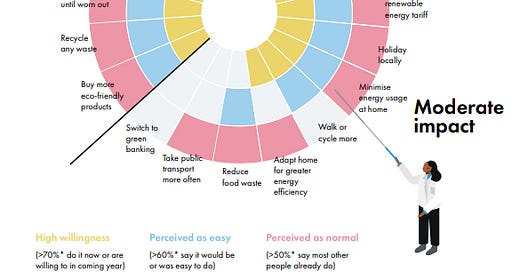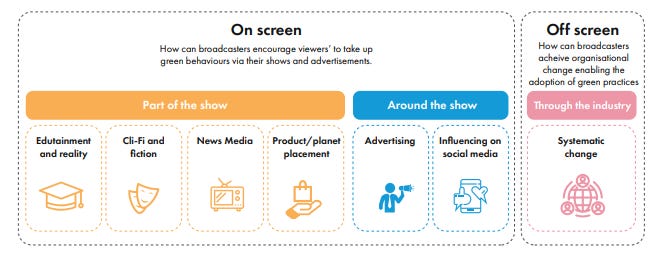Your TV is Nudging You to Decarbonise Your Lifestyle
The Behavioural Insights Team working with Sky
The Behavioural Insights Team (BIT), using research from Sky, launched a report at the United Nations’ 26th Climate Conference in Glasgow in 2021. The report, “The power of TV: nudging viewers to decarbonise their lifestyle”, looked at how TV can change viewers behaviour without realising they have ever been nudged.
CEO, David Halpern, thinks that it is his job to re-calibrate the world to think as he does. Halpern says that the International Energy Agency believes we need to tackle climate change and to do this we need to reduce our demand for high-carbon activities and materials and take up new low-carbon technologies. Therefore, he says we must change what we buy and what we eat and change the technologies we use to heat our homes and travel. However, reaching Net Zero is conditional on large numbers of people taking up these green behaviours and products.
Behavioural science can shed light on how this unprecedented behaviour change can be achieved in time. People’s behaviours are shaped by their capabilities, opportunities and motivations and their decisions are affected by cognitive biases and mental shortcuts. Our behaviour is also strongly affected by our physical and social environment - from what is available on supermarket shelves, to what we watch on television. In other words, our individual behaviours are embedded within, and constrained by, the world around us.
Halpern asks the question - “How can we nudge viewers to decarbonise their lifestyles?”
Dana Strong, Group Chief Executive of Sky, also believes that it is her responsibility to decide on how her fellow citizens live their lives. “It is now widely accepted that we must shift the behaviour of millions of people to deliver on our collective net zero goals”, she says.
To achieve Net Zero, BIT wants widespread behavioural change at a societal level. They estimate that 63% of emissions reductions will come about through behavioural changes. Their target is for 1 in 10 TV viewers to change their behaviours. In doing so, BIT thinks this will save 1.1 billion tonnes of CO2 emissions per year by avoiding food waste, avoiding medium-length flights, switching to a plant-based diet and switching to an electric vehicle.
However, even if their nudging tricks go to plan, the BIT says that an additional 22.2 billion tonnes of CO2 will need to be cut if we are to limit global warming to 1.5C.
There is no doubt in their minds that man-made climate change is occurring and that cutting CO2 emissions is the only way out. “The question must be not if, but how, best to use this powerful tool of persuasion for maximum good”, they say.
So where will the TV industry focus on nudging you?
In the chart above, the BIT wants all the segments filled with a colour. They are likely to focus on the high impact actions, so get ready for your TV to normalise flying less often, eating less meat and dairy and switching to an electric vehicle.
How will broadcasters nudge you to make these changes?
According to cultural studies theory, the two key mechanisms for broadcasters to influence viewers is through 1) transportation6 and 2) identification. Transportation refers to the fact that the more emotionally engaging a film or a show is, the more immersed we get which makes us more receptive to the arguments outlined, even if they run counter to our current viewpoint. In terms of identification, if the characters on screen reflect our characteristics, views or aspirations, we’re more likely to connect with them emotionally and perceive them as role models of behaviours we should seek to emulate.
They even stoop so low as to suggest brainwashing children to encourage adults to make behavioural changes. They call this tactic of brainwashing children to bully adults, ‘intergenerational spillovers’.
Broadcasters should use kids' content to encourage positive environmental behaviours amongst children and their parents. Children are not only the decision-makers of the future – and most likely to be affected by climate change – but also important influencers on their parents.
These techniques are manipulative and infringe on viewers’ right to make their own independent decisions. The TV industry’s role should be to inform and entertain, not to influence viewer behaviour according to a particular agenda. Especially when that behaviour will actually impoverish the viewer without even achieving the Net Zero goals they desire. Moreover, the strategy of creating a generational divide, pitting child against parent in the name of environmental consciousness, is not just ethically questionable, but morally reprehensible.
I encourage you to delve into the entire document to understand the full extent of the planned behavioural nudges. The ethical implications of nudging are clear for all to see. It is not the role of broadcasters to shape public behaviour and viewers should be aware of how they are being influenced. Nudging should be banned and the BIT shut down.






Awesome, let's start with decarbonising the TV Set, and we could stop there
less dairy products and eat less meat. and more bugs on the menu.. I live in Alberta, our premier has just given the cattle industry to increase beef production..nice going against the narrative and pissing off WEF puppet Justin Trudeau.